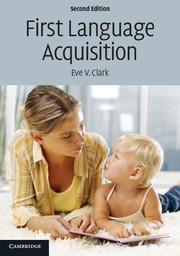Book contents
- Frontmatter
- Contents
- List of tables, boxes, and figures
- Acknowledgements
- 1 Acquiring language: Issues and questions
- Part I Getting started
- Part II Constructions and meanings
- 7 First combinations, first constructions
- 8 Modulating word meanings
- 9 Adding complexity within clauses
- 10 Combining clauses: More complex constructions
- 11 Constructing words
- Part III Using language
- Part IV Process in acquisition
- Glossary
- References
- Name index
- Subject index
11 - Constructing words
from Part II - Constructions and meanings
- Frontmatter
- Contents
- List of tables, boxes, and figures
- Acknowledgements
- 1 Acquiring language: Issues and questions
- Part I Getting started
- Part II Constructions and meanings
- 7 First combinations, first constructions
- 8 Modulating word meanings
- 9 Adding complexity within clauses
- 10 Combining clauses: More complex constructions
- 11 Constructing words
- Part III Using language
- Part IV Process in acquisition
- Glossary
- References
- Name index
- Subject index
Summary
As children learn more words, storing them in memory and producing them as needed, they begin to identify and analyze the meanings of parts of complex words – affixes (prefixes, suffixes, infixes) and roots or stems. Once children can analyze the internal structure of words, they can make use of stems and affixes as building blocks for new words to convey new meanings. To exploit this resource, though, children must be able to analyze words into their constituent parts, assign meanings to those parts, and learn which combinations of parts are allowed in the language they are acquiring. Coining words represents another type of complexity in acquisition.
Languages differ in which types of stem and affix combinations they license and in the meanings conveyed by different types of word-formation. Some languages rely extensively on compounding or the combination of word-roots, as in sun-dial or rabbit-hole; others rely on derivation or the combination of word-roots with affixes, as in green-ish or re-read; and many rely on both, as in shoe-maker or watering-can. If some options are easier to acquire than others, children acquiring different language-types should reflect this in their acquisition of word-formation.
The focus in this chapter is on children's acquisition of compounding and derivation in word-formation, as displayed in their coinages to fill gaps in their current vocabulary.
- Type
- Chapter
- Information
- First Language Acquisition , pp. 254 - 278Publisher: Cambridge University PressPrint publication year: 2009



